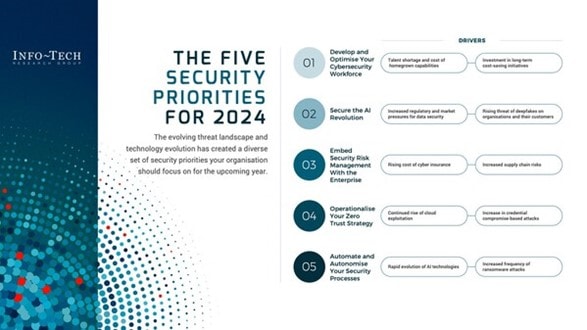Cybersecurity talent shortage, the rise of AI-driven threats, the integration of security risks with business risks, the adoption of zero-trust frameworks, and the increasing significance of automating security operations are among the top issues APAC IT and security leaders must prioritise over the coming year according to Info-Tech's Security Priorities 2024 report.

High-priority initiatives
The report also outlines five high-priority initiatives organisations should implement to address security risks for 2024 and beyond.
The initiatives include developing and optimising the cybersecurity workforce by identifying skills gaps and organisational needs, defining the security resourcing plan, and determining an approach to acquiring the necessary expertise.
Info-Tech also recommends operationalising zero-trust strategies and embedding security risk management by evaluating existing third-party risk management practices, establishing comprehensive policies, and communicating third-party risk management to executive leadership.
Finally, automating and autonomising security processes are prescribed to mitigate automated and AI-driven attacks.
Securing the AI revolution
Info-Tech also recommends organisations secure the AI revolution, with only over 40% of organisations not having AI governance in place.

"CISOs and security leaders could expect to find themselves in a situation where they must enable the adoption of new AI technologies while managing the risks that come with its rapid evolution. On the opposite end of this situation, delays or failure to enable AI adoption could see them fall behind peer organisations and exacerbate existing challenges like developing their cyber security workforce and operationalising zero trust security," Robert Dang, principal advisory director at Info-Tech Research Group, APAC said.



